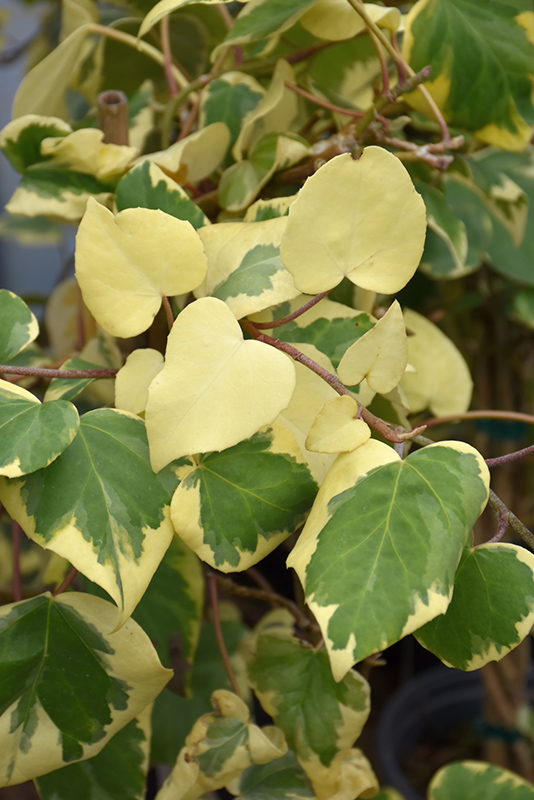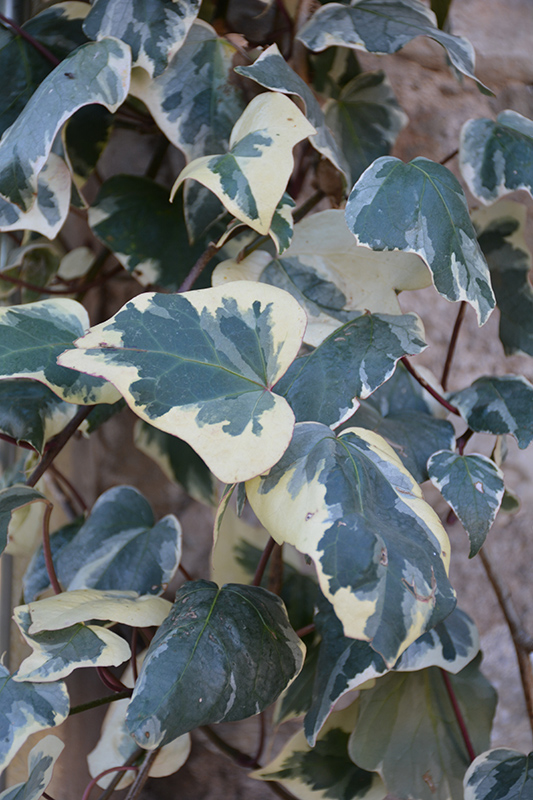Variegated Persian Ivy
Hedera colchica 'Dentata Variegata'
Height: 30 feet
Spread: 3 feet
Sunlight:
![]()
![]()
![]()
Hardiness Zone: 6a
Other Names: Bullock's Heart Ivy
Description:
A spreading and climbing form of ivy; large, glossy dark green, hear-shaped leaves, variegated in creamy yellow; many uses for this distinctive plant include hanging baskets, groundcover, or climbing walls and arbors
Ornamental Features
Variegated Persian Ivy has attractive creamy white-variegated dark green foliage with hints of grayish green which emerges light green in spring on a plant with a spreading habit of growth. The large glossy heart-shaped leaves are highly ornamental and remain dark green throughout the winter. It features subtle clusters of chartreuse flowers with rose eyes at the ends of the branches from early to mid fall. The smooth bark and burgundy branches add an interesting dimension to the landscape.
Landscape Attributes
Variegated Persian Ivy is a dense multi-stemmed evergreen woody vine with a twining and trailing habit of growth. Its strikingly bold and coarse texture can be very effective in a balanced landscape composition.
This woody vine will require occasional maintenance and upkeep, and can be pruned at anytime. It has no significant negative characteristics.
Variegated Persian Ivy is recommended for the following landscape applications;
- Mass Planting
- Hedges/Screening
- General Garden Use
- Groundcover
- Naturalizing And Woodland Gardens
- Container Planting
Planting & Growing
Variegated Persian Ivy will grow to be about 30 feet tall at maturity, with a spread of 3 feet. As a climbing vine, it tends to be leggy near the base and should be underplanted with low-growing facer plants. It should be planted near a fence, trellis or other landscape structure where it can be trained to grow upwards on it, or allowed to trail off a retaining wall or slope. It grows at a medium rate, and under ideal conditions can be expected to live for approximately 30 years.
This woody vine performs well in both full sun and full shade. It prefers to grow in average to moist conditions, and shouldn't be allowed to dry out. This plant does not require much in the way of fertilizing once established. It is not particular as to soil pH, but grows best in rich soils, and is able to handle environmental salt. It is highly tolerant of urban pollution and will even thrive in inner city environments, and will benefit from being planted in a relatively sheltered location. Consider applying a thick mulch around the root zone in winter to protect it in exposed locations or colder microclimates. This is a selected variety of a species not originally from North America, and parts of it are known to be toxic to humans and animals, so care should be exercised in planting it around children and pets.
Variegated Persian Ivy makes a fine choice for the outdoor landscape, but it is also well-suited for use in outdoor pots and containers. Because of its spreading habit of growth, it is ideally suited for use as a 'spiller' in the 'spiller-thriller-filler' container combination; plant it near the edges where it can spill gracefully over the pot. It is even sizeable enough that it can be grown alone in a suitable container. Note that when grown in a container, it may not perform exactly as indicated on the tag - this is to be expected. Also note that when growing plants in outdoor containers and baskets, they may require more frequent waterings than they would in the yard or garden.

